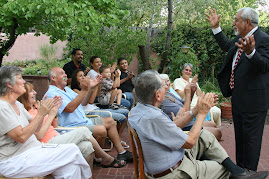Tuesday, August 19, 2008
Councilors Garduño and O'Malley Sponsor Labor Amendement
Last night, an ordinance that amends the impasse procedure of the City's Labor-Management relations. The bill, co-sponsored by Councilor Rey Garduño and Councilor Debbie O'Malley, allows for binding arbritaration when impasse is declared. Under the current ordinance, binding arbritration could only occur if both parties voluntarily agree to enter it, now only one party can volunteer for binding arbritaraiton and both would have to enter.
Below is an article about the bill from The New Mexico Independent;
ABQ CITY COUNCIL PASSES LABOR ORDINANCE
By Marjorie Childress 08/19/2008
The majority of the Albuquerque City Council said it was the only fair thing to do when they passed an ordinance tonight to allow binding arbitration to break an impasse during labor/city contract negotiations. The arbitration provision could be triggered by either side if mediation fails to break an impasse, and would apply only to non-economic issues, excluding management rights and alcohol and drug use policies.
Councilor Debbie O’Malley, who sponsored the bill, said the city simply doesn’t have true collective bargaining without the change. Councilor Rey Garduno agreed, saying that the ordinance would “level the playing field.” Currently, public employees are legally barred from striking, and therefore have no recourse to city imposed contracts when negotiations come to a stand still.
“The essence of a union is that if the employer doesn’t negotiate in good faith, they can strike,” Councilor Michael Cadigan explained. “In New Mexico the public unions can’t strike so we need to give them some fair leverage here.”
But Ed Adams, who was confirmed as the city’s Chief Administrative Officer earlier in the evening, said the city’s ability to provide services would be impaired by the ordinance because it would prevent the city from making critical staffing decisions about where and when public employees should work. “The bill is touted as leveling the playing field, but it reverses the playing field,” he said, ”...placing our futures in the hands of an arbitrator who on a whim can make a decision.”
Labor representatives disagreed. Andrew Padilla, president of AFSCME Council 18, said the point is to not get to an impasse, with both sides coming to reasonable agreement. This mechanism would prevent one side from having more leverage than the other, making that outcome more likely.
And AFSCME Council 18’s Josh Anderson added that, ”...as it stands, the union has an underlying belief when they enter into negotiations that the administration doesn’t have enough incentive because at the end of the day they can impose a contract.”
read the rest of the article here.
Below is an article about the bill from The New Mexico Independent;
ABQ CITY COUNCIL PASSES LABOR ORDINANCE
By Marjorie Childress 08/19/2008
The majority of the Albuquerque City Council said it was the only fair thing to do when they passed an ordinance tonight to allow binding arbitration to break an impasse during labor/city contract negotiations. The arbitration provision could be triggered by either side if mediation fails to break an impasse, and would apply only to non-economic issues, excluding management rights and alcohol and drug use policies.
Councilor Debbie O’Malley, who sponsored the bill, said the city simply doesn’t have true collective bargaining without the change. Councilor Rey Garduno agreed, saying that the ordinance would “level the playing field.” Currently, public employees are legally barred from striking, and therefore have no recourse to city imposed contracts when negotiations come to a stand still.
“The essence of a union is that if the employer doesn’t negotiate in good faith, they can strike,” Councilor Michael Cadigan explained. “In New Mexico the public unions can’t strike so we need to give them some fair leverage here.”
But Ed Adams, who was confirmed as the city’s Chief Administrative Officer earlier in the evening, said the city’s ability to provide services would be impaired by the ordinance because it would prevent the city from making critical staffing decisions about where and when public employees should work. “The bill is touted as leveling the playing field, but it reverses the playing field,” he said, ”...placing our futures in the hands of an arbitrator who on a whim can make a decision.”
Labor representatives disagreed. Andrew Padilla, president of AFSCME Council 18, said the point is to not get to an impasse, with both sides coming to reasonable agreement. This mechanism would prevent one side from having more leverage than the other, making that outcome more likely.
And AFSCME Council 18’s Josh Anderson added that, ”...as it stands, the union has an underlying belief when they enter into negotiations that the administration doesn’t have enough incentive because at the end of the day they can impose a contract.”
read the rest of the article here.
Subscribe to:
Posts (Atom)

